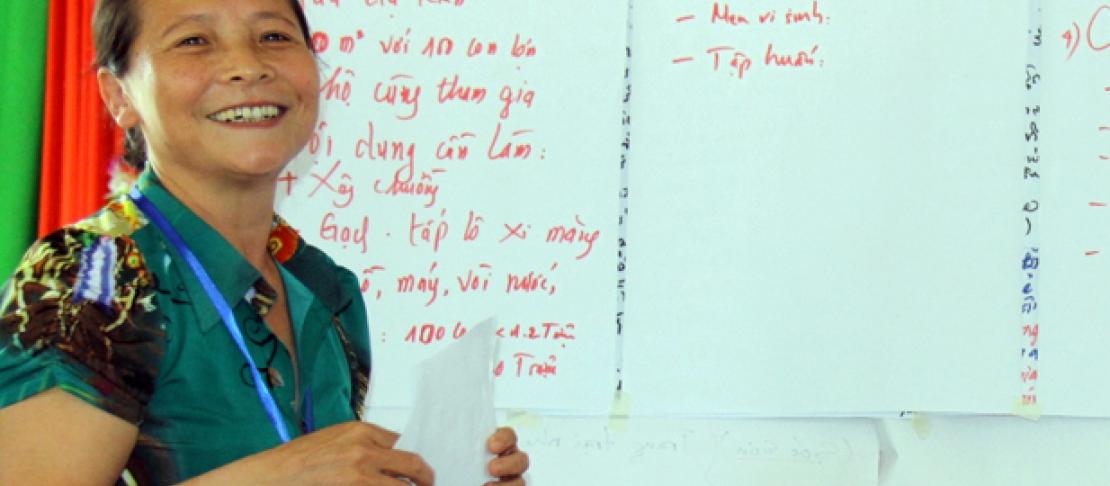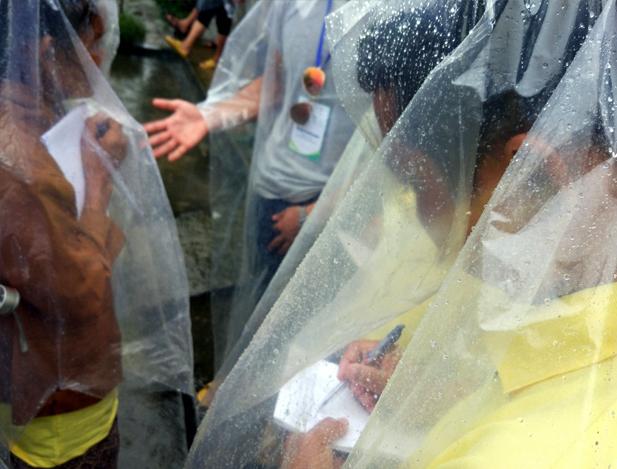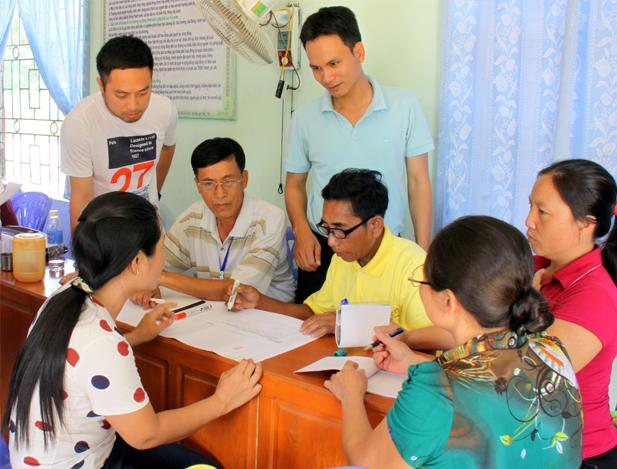Farmers as envoys of climate-smart agriculture to villages in Southeast Asia

A researcher discovers how farmers can be key agents to bringing about positive changes in their own villages, across landscapes.
It was my first time to hear the term roving workshop, much more join one. While I have only the slightest idea of what’s being done in such an activity, my excitement was apparent.
This opportunity came through a project which the World Agroforestry Center (ICRAF), my institution, implements under the CGIAR Research Program on Climate Change, Agriculture and Food Security in Southeast Asia (CCAFS SEA). So, last 23-27 May 2016, together with 19 farmers from the Climate Smart Villages (CSVs) from Vietnam, Cambodia and Lao PDR, we plied the route going to Ma CSV in Yen Bai province and My Loi CSV in Ha Tinh province.
CSVs are villages that are faced with climate change challenges, hence, farmers need to be supported by enhancing their capacities to adapt to and mitigate the impacts of climate change, thus, ensuring a sustainable and productive agricultural system and a secure food for the future.

Farmers were eager to learn despite the uncooperative weather. Photo: Duong Minh Tuan (ICRAF)
A platform for learning
The roving workshop aimed to train further the participating farmers on various climate-smart agriculture (CSA) practices and technologies through structured field visits with discussions and reflection exercises. It intended to develop farmers to become trainers and information sources of other farmers particularly on CSA in the CSVs.
The participants visited the demonstration sites of Northern Mountainous Agriculture and Forestry Science Institute and Field Crops Research Institute (FCRI), and farm sites of farmers in the CSVs where they presented an array of CSA interventions.
The day’s activity was wrapped up with participants giving an appraisal of their learning for the day. The last day was about sharing of thoughts and experiences of farmers from the three countries, along with the formulation of action plans for the CSA practices that farmers would apply in their villages.
A spectacle of climate-smart agriculture practices and technologies
Livestock production
“I’m very impressed, there’s no smell at all,” said Mrs. Nga, a member of the livestock group from My Loi, as she walked her way through an organic pig farm in Soc Son district. In raising over a thousand pigs, the farm owners use the Effective Micro-organism (EM) technology which makes use of beneficial microorganisms to hasten plant growth, decomposition, and livestock sanitation, among other applications.
Mrs. Nga was delighted upon knowing that ICRAF plans to conduct a training on EM in August of the current year.
In Ma CSV, Mrs. Lien saw improved structures of goat cages, which makes it easier to manage dozens of hybrid goats. Completely amazed, she remarked, “I will definitely apply this new technique when I come back to my village, even if I have to borrow money from outside source.”
School garden and vermiculture
Mr. Duong Van Tham, a village leader in My Loi CSV, participated in the first roving workshop held in the Philippines where he took inspiration from the school garden project of the International Institute of Rural Reconstruction (IIRR) in Cavite City. He committed to do the same in his village, same with the vermiculture model. With support from CCAFS and ICRAF, his plans came to fruition.
Mr. Tham initiated a school garden in My Loi which grows about 20 different kinds of vegetables and provides nutritious meals for about 500 children in the village. The teachers in Ky Son kindergarten manage the garden and the harvests provide them a monthly income of USD 400.
In another part of My Loi CSV, Mrs. Luu and Mr. Thuy maintain a vermiculture farm from an initial 50 kg earthworm material acquired in October 2015. They feed the worms to their geese, sell about a hundred kilos in the local market, and few more kilos are generously shared to other households.
Meteorology station
My Loi farmers have relied on their indigenous knowledge and experiences in predicting weather patterns. To provide the farmers with a more accurate and real-time agro-climatic information, a mini meteorology station was put up for the project “Enhancing Adaptive Capacity of Women and Ethnic Minority Smallholder Farmers through Improved Agro-Climate Information in Southeast Asia (ACIS)” that ICRAF Vietnam and CARE International jointly implement in Vietnam. Mr. Pham Thanh Thai, a village farmer, manages the station.
Biochar stove
Sixteen biochar stoves, developed by the Institute for Agriculture Environment, were distributed to village households in My Loi. These environment-friendly stoves effectively convert agriculture by-products to energy and reduce greenhouse gas emission compared to other commercial stoves available in the market.

The participants seriously discuss and identify CSA practices that they think would be most suitable for their CSV. Photo: Le Van Hai (ICRAF)
Plans for a sustainable future
After feasting their eyes and satisfying their curious minds of various CSA practices and technologies in the previous days, the farmers devoted the last day in making their own village action plans, which specify the CSA practices/technologies that they will implement in their villages, and how they will go about the implementation. The action plans will be reviewed by CCAFS SEA and evaluated as to the feasibility and possible support that can be provided. Across the six CSVs, the common technologies that the farmers would want to focus on are the use of short-term rice varieties to adapt to climate change, livestock raising using EM, and vermiculture.
Tuan Minh Duong is a research assistant at the World Agroforestry Centre.



